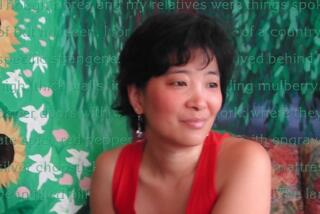Book Review : Woman’s Odyssey of Survival, Courage
The Survival of Jan Little by John Man (Viking: $17.95, 384 pages)
Jan Little grew up when Carmichael, Calif., was a tiny farming community north of Sacramento. Doubly handicapped by poor eyesight and impaired hearing, she was a solitary, solemn, quiet child, always an outsider and a dreamer. When her house burned to the ground, her parents sent her to stay temporarily with a family of Ozark homesteaders who had settled in the area.
Though living conditions in the 1930s were Spartan, Jan was happier than she had ever been. Back with her family, she struggled to conform to their ambitions for her--college, secretarial school, a conventional life; never quite succeeding. At 21, she moved to San Francisco, where one brief romance left her pregnant. She married and immediately divorced the man, determined to raise her daughter independently, subsisting on the father’s meager allowance and California Blind Aid payments. On the advice of friends, she moved to San Cristobal, a picturesque Mexican town near the Guatemalan border where in 1952, an American could live decently on next to nothing, which was exactly what Jan had. She found a pleasant house, rented the extra rooms to visiting archeologists studying the regional Indian culture, and one way and another, managed to create a comfortable niche for herself.
Biblical Helpmeet
Her amazing story truly begins the day she met Harry Little, a self-proclaimed writer, an intellectual vagabond who had left Vermont to settle in the jungle. Harry was looking for a biblical helpmeet; a strong, plain woman utterly without vanity who would accept his dictates unquestioningly. Jan yearned for love and security; had taught herself to live in isolation. She fit the bill perfectly. At first, she could hardly believe her luck--this handsome, persuasive man not only wanted her but welcomed her daughter, Rebecca. Their fantasies meshed; she overcame the disquieting sense that Harry was too good to be true and married him.
Their first homestead was in Mexico’s Lacandon forest, a remote and steamy jungle inhabited only by a dwindling Indian tribe. Harry had preceded her there, built a palm-thatched hut, set out an acre of citrus trees and bananas, brought the bare essentials of life. As they worked in the garden, Harry talked excitedly and incessantly, elaborating upon his notions of living in harmony with nature, creating a private Utopia for the three of them. Jan listened entranced, straining to catch every word of his dazzling perorations. Against all odds, the three stayed reasonably healthy and the farm thrived, though Harry soon became restless. The civilization he loathed was gradually encroaching upon their paradise, and he determined to abandon the settlement for an even more isolated and inaccessible place.
Her own will now totally subsumed in Harry’s, fired by his passion, Jan obediently followed with her daughter. At the new homestead, they lived in a cave until a crude house could be built by Indian workers. Harry feverishly wrote novels, one after another, all rejected; Jan planted, weeded, harvested and typed his books for him, while Rebecca, now nearing her teens, slaved beside her mother and worked on her correspondence school lessons.
With no basis of comparison to the lives of other children and only the Indian villagers for companions, Rebecca was not unhappy. Except for their radio and books, the Littles could have been living in the Garden of Eden. The impossible dream seemed fulfilled until one day surveyors came to lay out a jungle road, and Harry decided to move on, deeper, further; to find an impenetrable primeval fastness where they would never be disturbed.
Heart Condition
There, at the base of a mountain rising from a tributary of the Rio Negro, a site reachable only by canoe, Harry found his tropical Homestead Hill. By this time, Harry’s chronic heart condition and other physical problems had worsened; Jan’s sight had deteriorated so that she could see only sharp contrasts; her hearing was virtually gone.
Most of the numbing, backbreaking work now fell to Rebecca; and 1976 was a drought year; their crops withered, the stream fell too low even for supply canoes to reach them. They began to starve. Incredibly, three more years passed before a mysterious tropical illness killed first Rebecca and then Harry, leaving Jan alone, desperately ill, blind and deaf; slipping in and out of consciousness.
At that point, Jan Little’s story stops being merely extraordinary and becomes truly awesome, an odyssey of courage, fortitude, endurance and mounting horror. She has survived to tell her experiences to the television documentary maker John Man, who has taken it down as given. The prose is serviceable and matter-of-fact, the material itself supplying melodrama and imagery to spare.
To summarize the events following the third and last homestead attempt in the Rio Negro river country on the border of Brazil and Venezuela, six days by canoe from a rudimentary settlement, would diminish the power and tension of this astonishing writer herself, could never find a way to make it credible until John Man helped her relive her adventures.
More to Read
Sign up for our Book Club newsletter
Get the latest news, events and more from the Los Angeles Times Book Club, and help us get L.A. reading and talking.
You may occasionally receive promotional content from the Los Angeles Times.






